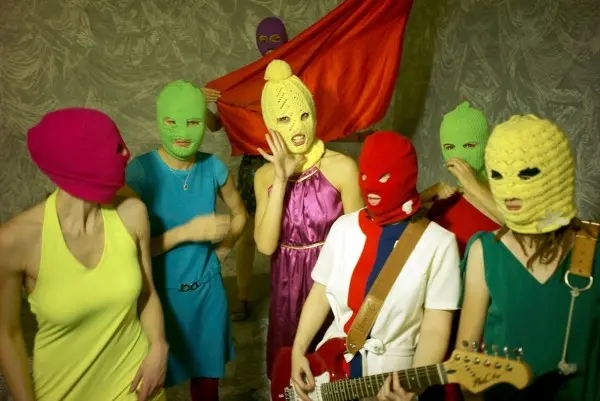
The evening of Monday the 15th of October saw the 'Pussy Riot in Parliament' event held in the UK's Houses of Parliament, organised by Kerry McCarthy, MP for Bristol East.
The proceedings focused on readings of the three defendants' closing statements, followed by a panel discussion on the Pussy Riot case, and the role of the arts in political protest more broadly.
The panelists were Natalia Kaliada, co-founder of Belarus Free Theatre, and political exile since late 2010; Joan Smith, novelist, journalist, and human rights campaigner; Dorian Lynskey, author of 33 Revolutions Per Minute: A History of Protest Songs; and Chris Bryant, MP for Rhondda. The event was chaired by Goldblade vocalist and Louder Than War editor, John Robb. Attendees included representatives from Amnesty International, the artists' trade union Equity, the writers' rights group English PEN, the NME, The Pod Delusion, and Punknews, among others.
While the speakers all held the attention of the audience, there was a particular stillness, a particular weight in the room, when Ms Kaliada spoke about the Belarusian situation, and her experiences as co-founder of the Belarus Free Theatre. As she explained, Belarus is the last true dictatorship in Europe, having been ruled by Alexander Lukashenko since 1994. She spoke of the realities of living in a true dictatorship, of friends being imprisoned, tortured, or disappeared, simply for being critical, or being perceived to be critical, of the regime. Two quotes in particular stuck out as being particularly relevant to our remit here on Punknews:
In Belarus, all articles of the Universal Declaration of Human Rights are violated.
All rock bands are prohibited in Belarus.
She also noted darkly that the event had attracted a roomful of journalists, writers, artists, and human rights campaigners, but the only MPs in attendance were Ms McCarthy and Mr Bryant.
At this point in the proceedings, news came through that the appeal to prevent the two Pussy Riot members still in custody from being moved to a penal colony, and thus unable to see their young children for the duration of their sentences, had been denied.
Given the fast paced nature of the event, and the sheer amount of information imparted, these were the only portions of the discussion proper your Punknews correspondent managed to note down verbatim, but quotes from two of the other panelists, as well as organiser Kerry McCarthy, were attained afterwards, excerpts of which can be found below:
Kerry McCarthy, MP:
Bringing Pussy Riot to parliament, as an issue, was important to me as a way we could show that the world is still watching, still cares, and will still carry on fighting not just against the injustice of their trial and sentence, but against the wider human rights violations and oppression they were seeking to highlight in the first place.
The key thing now is to maintain the level of international interest. People need to write to their political representatives, asking them to raise the case with the Foreign Office and the Russian embassy. They can sign up to the Pussy Riot action on Amnesty International's websites (UK/USA. They can put on local Pussy Riot events with music, or just to talk about the issues, and raise some money for the Free Pussy Riot legal defence fund. And just keep mentioning Pussy Riot, online, in print, wherever, so that the band know we're still supporting them. They do get to hear about it, and it means a lot to them.
Joan Smith on Putin:
This is a man who cultivates a parodic version of masculinity - he's always stripping to the waist to fish in rushing streams or ride bare-back. He's a patriarch, and patriarchal leaders know how to deal with other powerful men. Look at the number of oligarchs who've ended up in exile, and of course Khordokovsky is in prison.
What Putin didn't expect was to be challenged by a group of young women who've named themselves after their vaginas. I suspect it's outraged him in ways he doesn't even understand, and that's why his government was so determined that the court case would go ahead. It's a PR disaster, and shows how innovative forms of protest unsettle authoritarian leaders.
Dorian Lynskey:
People in the UK and US often bemoan the dwindling power of protest music but the Pussy Riot case demonstrates how much of a threat to the authorities music can still be if it mixes power, courage, intelligence and theatrical flair. Itâs striking how much the plight of one rock band has focussed attention on civil liberties in Russia. They are certainly not the only victims but it often takes a case like this to put a face on a broader problem.
I hope that international concern doesnât wane now that two of the women have been imprisoned. This feels like a turning point but it will only really be one if people outside Russia continue to pay attention.
If you'd like to hear even more, James O'Malley interviewed Kerry McCarthy and John Robb for the latest episode of The Pod Delusion, which you can listen to here